Out of the Blue Hills: A KoreAAR
- Thread starter unmerged(213294)
- Start date
-
We have updated our Community Code of Conduct. Please read through the new rules for the forum that are an integral part of Paradox Interactive’s User Agreement.
You are using an out of date browser. It may not display this or other websites correctly.
You should upgrade or use an alternative browser.
You should upgrade or use an alternative browser.
@ sprites: yeah, I hear that  I do want to start grabbing some better stuff soon
I do want to start grabbing some better stuff soon
@blsteen: I sure hope so!
@dinofs: there may be difficulties with that plan
@blsteen: I sure hope so!
@dinofs: there may be difficulties with that plan
Chapter 6 - Minors everywhere
As the serfs and minor nobles of the newly acquired lands of Lan Xang began to accept their new role in the Korea kingdom, King Ye turned once again to thoughts of expansion in Southeast Asia. He realized that a conflict with the major powers in Asia was inevitable, but he needed to secure more of a power base before he could move against them.
A natural target for the growth of the kingdom's borders was the tiny principality of Sukthothai. As his forefathers had done before him, King Ye decided to move without notice or cause against the small kingdom. He did not suspect what would happen as his armies crossed the border:

The surrounding petty kings and rulers decided to honour their guarantees of Sukthothai! The conflict quickly escalated from little more than a land grab to a minor war between Korea on the one hand, and Ayutthaya, Lan Na, Shan, Sukthothai, and Taungu on the other.
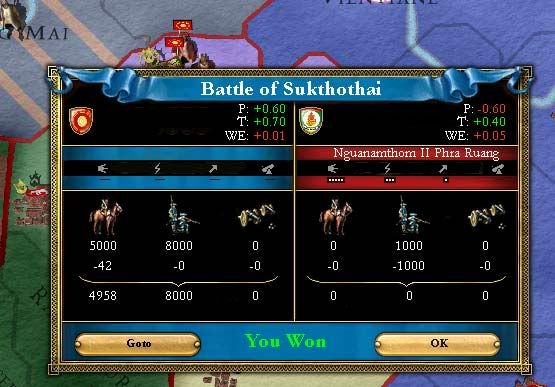
The miniscule army of Sukthothai was quickly dispatched, and Lan Na begged for a white peace in the face of Ming aggression. The fortress of Sukthothai fell before its Korean besiegers and it was swiftly brought into the Korean realm.
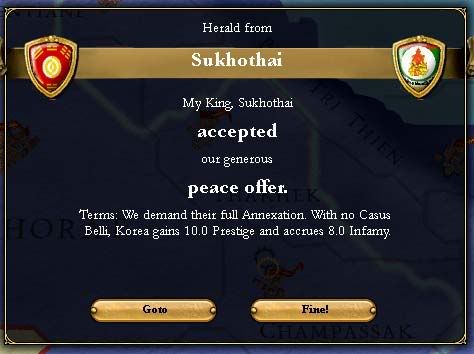
Shan also requested a white peace - Ye granted their wish since his interest in the kingdom of Shan was minimal. However, both Ayutthaya and Taungu had the temerity to attack Korean provinces!
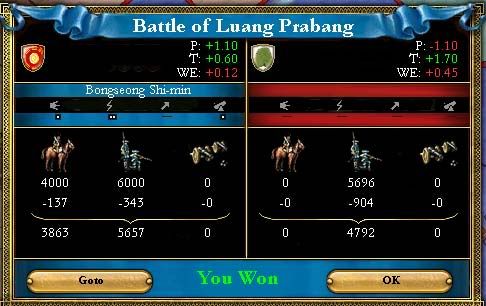
Korean armies marched into the Ayutthaya lands and placed the capital and Ratchaburi under siege. Ayutthaya's king, battered by the forces of King Ye and by the Ming, begged repeatedly for a white peace. However, King Ye was too furious with the Ayutthaya for their gall in attacking his lands. While he allowed them to keep their lands, he did force several concessions from them.
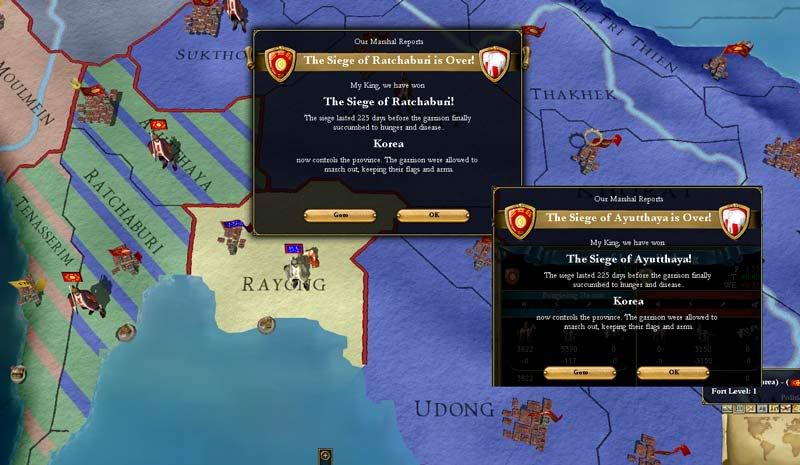
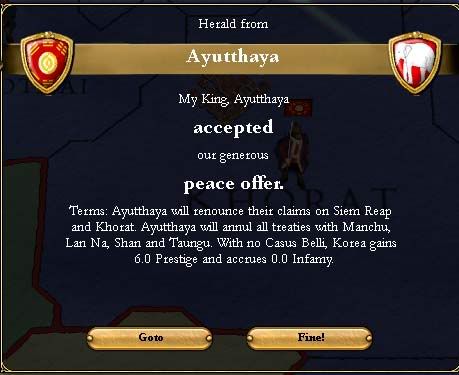
This left Taungu alone against the might of Korea. Although their provinces were separated from the Korean lands, Ye sent his diplomats to Lan Na to acquire access rights. To the surprise of the Korean court, Lan Na accepted the agreement and allowed the Koreans to march once again on their land. It seemed shocking so soon after being at war, but Ye simply smiled at his good fortune and ordered his generals to attack the homelands of Taungu.
While the initial fighting was raging, Ye received word from his ministers that his policies with regard to his serfs were bearing fruit - the production capabilities of his provinces were growing!
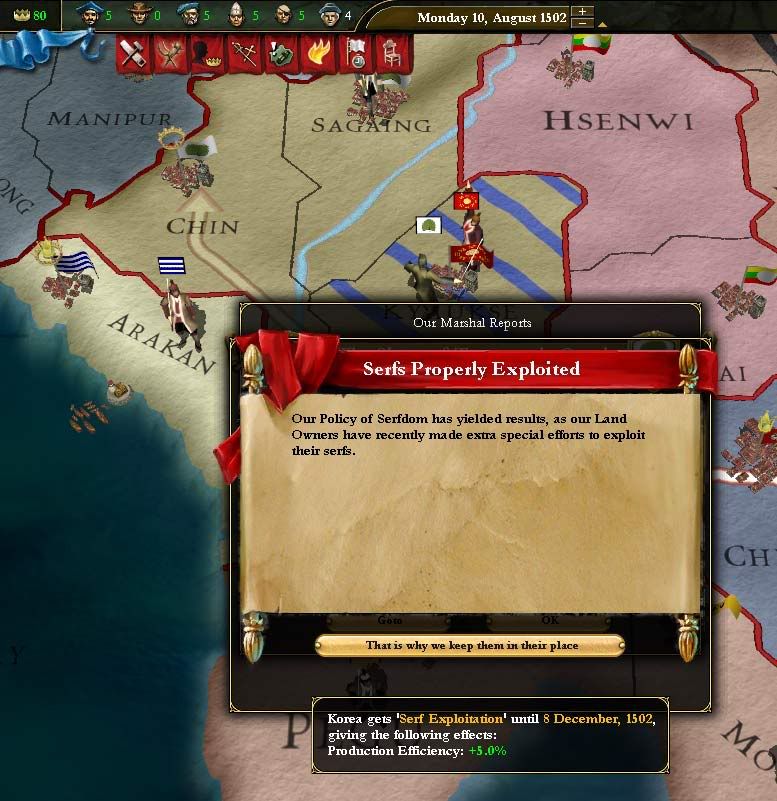
Gradually, the Korean armies whittled down the Taungu main army. Although it marched from defeat to defeat, the Taungu commander somehow managed to maintain his troops' morale for many battles. In the end, his efforts were ended by showers of arrows from the Korean longbowmen and his castles were thrown down.
Having total control of the homelands of Taungu left Ye with several options to end the war. Though many believed he would annex their lands as he had annexed so many other lands, Ye decided to go in a different direction:
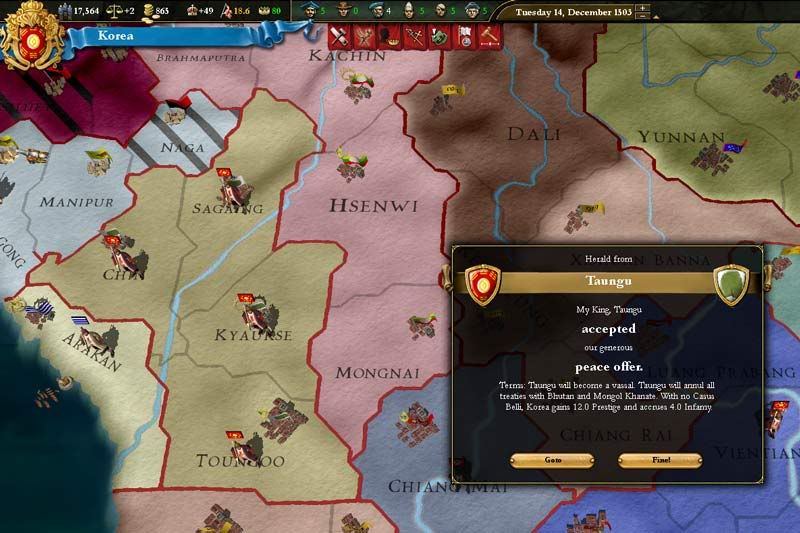
Gaining Taungu as a vassal would allow Korea to expand its influence in the area, as well as providing a puppet state to support its goals against the Ming.
Gameplay comments:
I was a little unfocused for this game session (thanks to my young children and the joys of sleep deprivation!), so I meandered a bit. I don't think it was really worth the effort to acquire Sukthothai and gain Taungu as a vassal (although I like having a vassal out there). At this point, I need to focus on getting my realm together for a big push against Japan or Ming to really establish myself in the area. We'll see how it goes!
As the serfs and minor nobles of the newly acquired lands of Lan Xang began to accept their new role in the Korea kingdom, King Ye turned once again to thoughts of expansion in Southeast Asia. He realized that a conflict with the major powers in Asia was inevitable, but he needed to secure more of a power base before he could move against them.
A natural target for the growth of the kingdom's borders was the tiny principality of Sukthothai. As his forefathers had done before him, King Ye decided to move without notice or cause against the small kingdom. He did not suspect what would happen as his armies crossed the border:

The surrounding petty kings and rulers decided to honour their guarantees of Sukthothai! The conflict quickly escalated from little more than a land grab to a minor war between Korea on the one hand, and Ayutthaya, Lan Na, Shan, Sukthothai, and Taungu on the other.

The miniscule army of Sukthothai was quickly dispatched, and Lan Na begged for a white peace in the face of Ming aggression. The fortress of Sukthothai fell before its Korean besiegers and it was swiftly brought into the Korean realm.

Shan also requested a white peace - Ye granted their wish since his interest in the kingdom of Shan was minimal. However, both Ayutthaya and Taungu had the temerity to attack Korean provinces!

Korean armies marched into the Ayutthaya lands and placed the capital and Ratchaburi under siege. Ayutthaya's king, battered by the forces of King Ye and by the Ming, begged repeatedly for a white peace. However, King Ye was too furious with the Ayutthaya for their gall in attacking his lands. While he allowed them to keep their lands, he did force several concessions from them.


This left Taungu alone against the might of Korea. Although their provinces were separated from the Korean lands, Ye sent his diplomats to Lan Na to acquire access rights. To the surprise of the Korean court, Lan Na accepted the agreement and allowed the Koreans to march once again on their land. It seemed shocking so soon after being at war, but Ye simply smiled at his good fortune and ordered his generals to attack the homelands of Taungu.
While the initial fighting was raging, Ye received word from his ministers that his policies with regard to his serfs were bearing fruit - the production capabilities of his provinces were growing!

Gradually, the Korean armies whittled down the Taungu main army. Although it marched from defeat to defeat, the Taungu commander somehow managed to maintain his troops' morale for many battles. In the end, his efforts were ended by showers of arrows from the Korean longbowmen and his castles were thrown down.
Having total control of the homelands of Taungu left Ye with several options to end the war. Though many believed he would annex their lands as he had annexed so many other lands, Ye decided to go in a different direction:

Gaining Taungu as a vassal would allow Korea to expand its influence in the area, as well as providing a puppet state to support its goals against the Ming.
Gameplay comments:
I was a little unfocused for this game session (thanks to my young children and the joys of sleep deprivation!), so I meandered a bit. I don't think it was really worth the effort to acquire Sukthothai and gain Taungu as a vassal (although I like having a vassal out there). At this point, I need to focus on getting my realm together for a big push against Japan or Ming to really establish myself in the area. We'll see how it goes!
oh-oh Vijayanagar expanded up to bengal?  they can be as bad as ming if they unite the subcontinent , but at least you are brothers in faith now
they can be as bad as ming if they unite the subcontinent , but at least you are brothers in faith now 
@thebigboss-89: I'm sure trying 
@sprites: maybe that was why I converted? lol
@dinofs: well, I'm gonna annex SOMETHING
One update today, then probably no more until Monday. Thanks again for reading and commenting guys!
@sprites: maybe that was why I converted? lol
@dinofs: well, I'm gonna annex SOMETHING
One update today, then probably no more until Monday. Thanks again for reading and commenting guys!
Chapter Seven - Peaceful Intentions
With a large portion of Southeast Asia under his control, King Ye knew that it was time to consolidate his gains and increase the wealth and capabilities of his nation. While he did not feel that he had accomplished all he might have wished in terms of conquest, he knew that he could leave his successors with a base to start with that would allow them to dominate Asia.
Never one to act timidly, Ye decided that a bold economic move was necessary - the creation of a new Centre of Trade. It was decided that Vijaya would host the new merchant centre, as the benefits of the trade would be more useful in a productive province. Vijaya's location on the coast might also draw the more adventurous merchants - those who would colonize new lands in the name of the Korean throne in return for monopolies on the new areas.
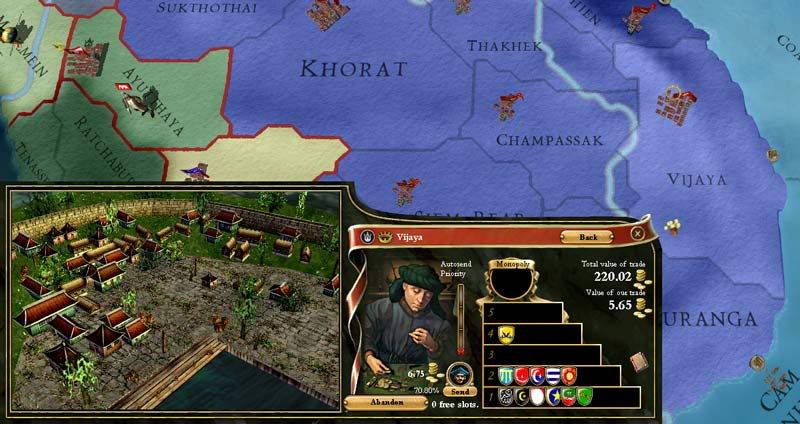
The establishment of the Centre of Trade had indeed attracted several adventuresome merchants - Ye granted them a charter and offered the use of his cogs to establish the first colony of the Korean throne on the island of Taiwan. A detachment of soldiers was also sent along to ensure that the natives recognized their place in the hierarchy.
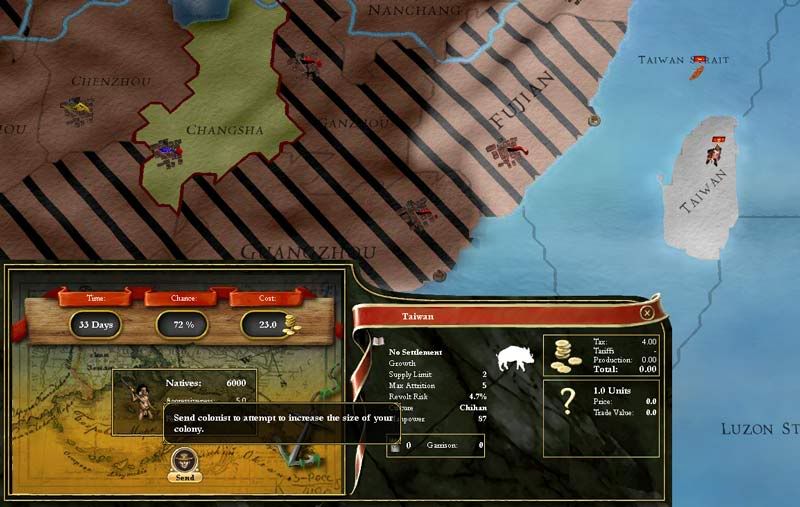
Once the new Centre of Trade had been established and the taxes had begun to flow, King Ye felt that his kingdom was at a point of equilibrium. His advisors and bureaucrats could deal with the day-to-day happenings while the king would bide his time, waiting for the full integration of the former Lan Xang provinces into the Korean realm. With that thought in mind, Ye ventured to his countryside palace to enjoy a period of relaxation.
The thunder of hooves on the bricks of the courtyard shattered his relaxation almost immediately however. Ye's advisors had sent word that a diplomatic slip by the King of Ayutthaya had the possibility of being exploited into a cause for war and a claim to the lands of Ayutthaya province itself! (Conquest CB on Ayutthaya giving me a free core! Woohoo!) A messenger was quickly dispatched to inform the king of Ayutthaya that his false reign over the province would soon be at an end.
Korean forces stormed into Ayutthaya and confronted the 6,000 man strong Ayutthaya force there, engaging them in a bloody but victorious battle.
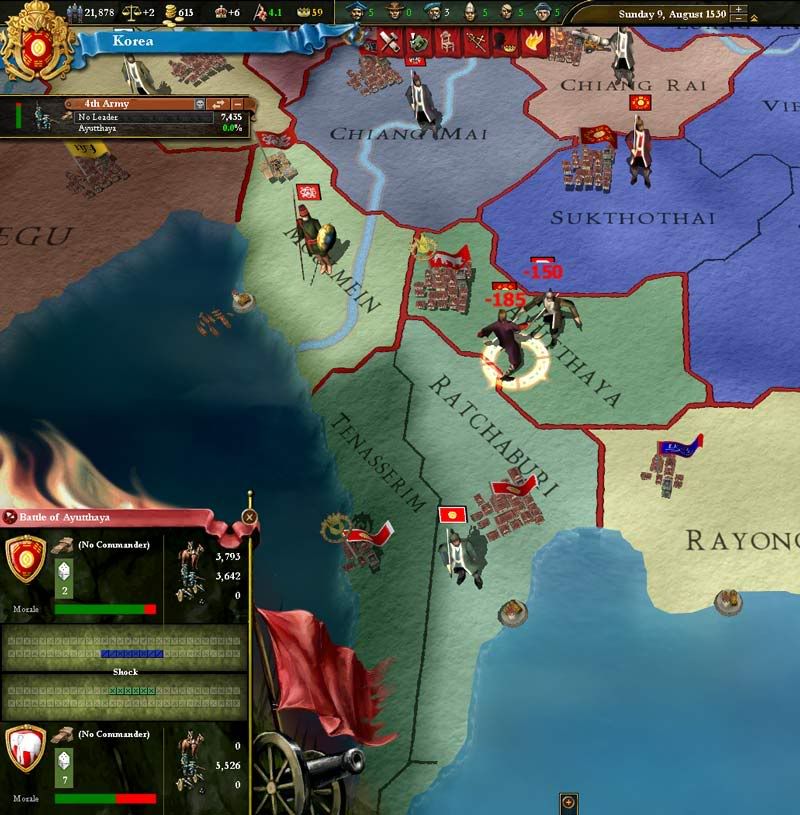
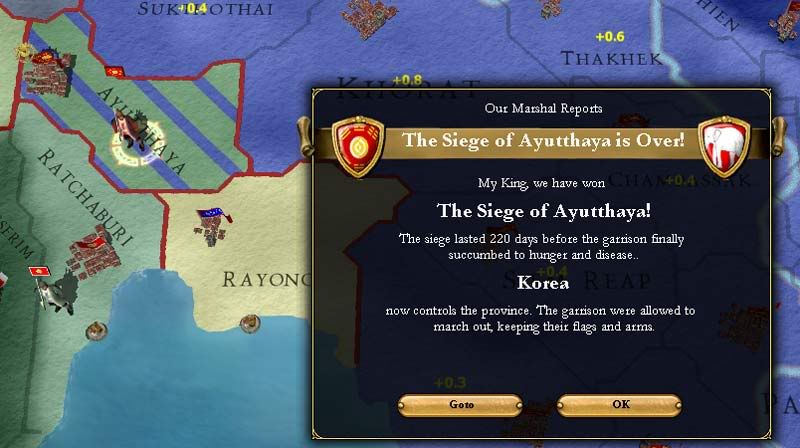
The speed of the victory and the complete success of the diplomatic maneuver pleased Ye - he had acquired a valuable province which was willing to join the Korean kingdom immediately and had gained even more concessions from Ayutthaya.
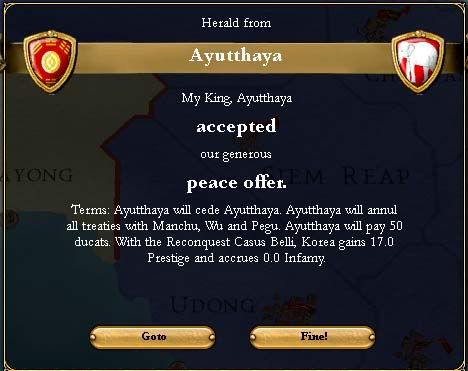
However, the sweetness of the victory would soon sour. Manchu, in its arrogance, used the Korean king's just intervention as a cause for war, declaring that their intention was to protect the independence of Ayutthaya! A large Manchu army crossed the border into the lightly-defended homelands of Korea. The small Korean garrison force, outnumbered by nearly 10,000 men, was ordered to do everything in its power to slow down the Manchu advance. Its general, knowing that his life and his men's lives were forfeit, engaged the Manchu then drew them into a long series of marches and counter-marches in the northern foothills of Korea. This brave but ultimately fatal course of action allowed for the emergency recruitment of a new army in the southern provinces. Pyeongan soon fell to the Manchu, but the combination of the siege and the efforts of the garrison troops had done what was necessary to allow the new army to get into position.
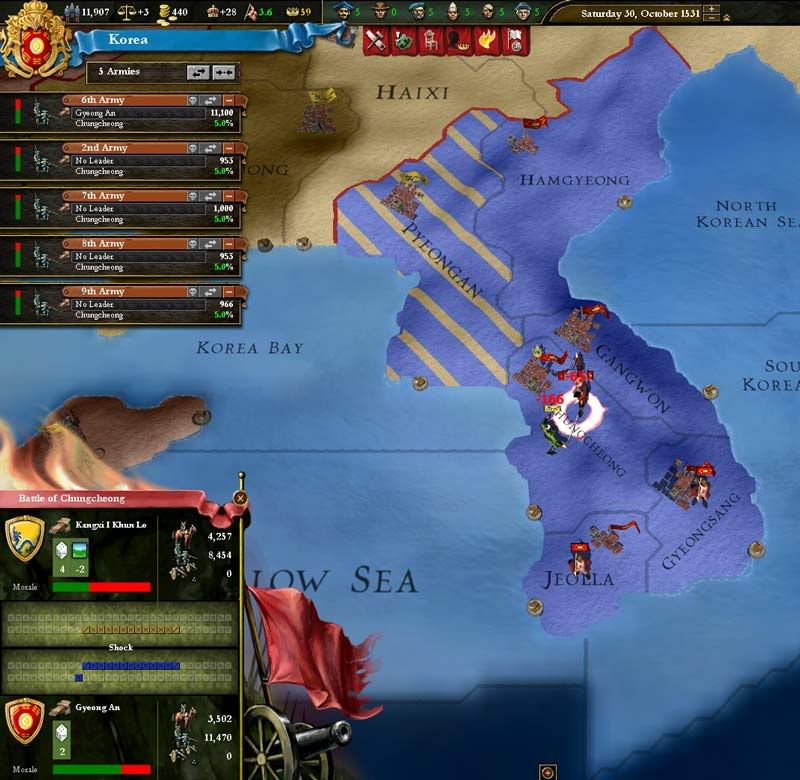
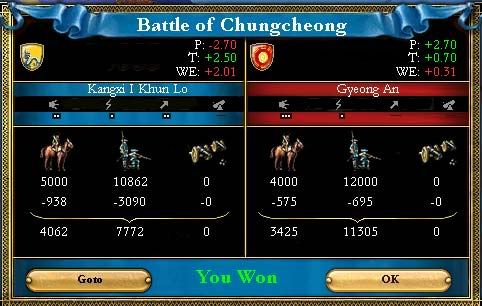
The newly-established Punitive Army of Korea drove the remnants of the Manchu invaders back into their lands and finally destroyed them in Haixi while a detachment lifted the occupation of Pyeongan.
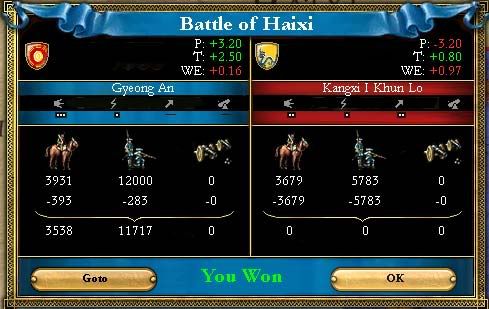
This left the lands of the Manchu virtually undefended, and general Gyeong An quickly moved to separate his forces into siege groups that spread across the Manchu provinces.
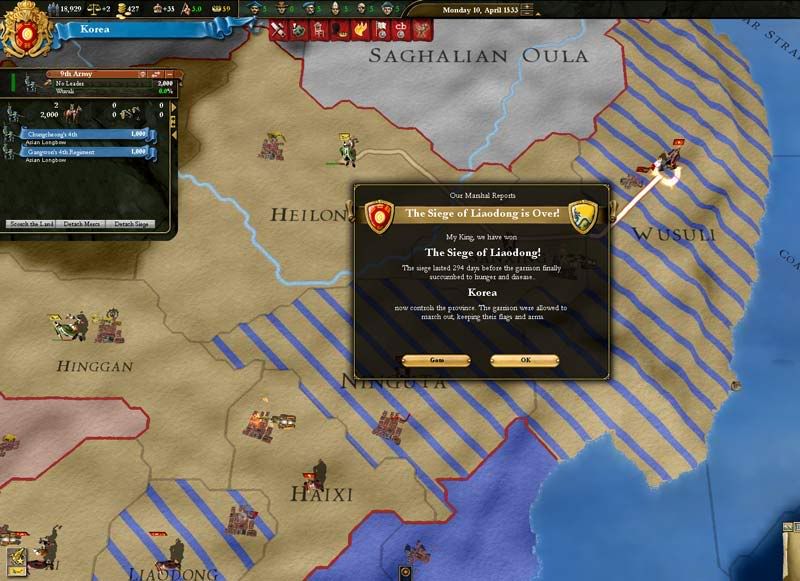
Meanwhile, the exploits of the Korean army had impressed the Southeast Asian subjects of the king that they willingly submitted totally to his authority.
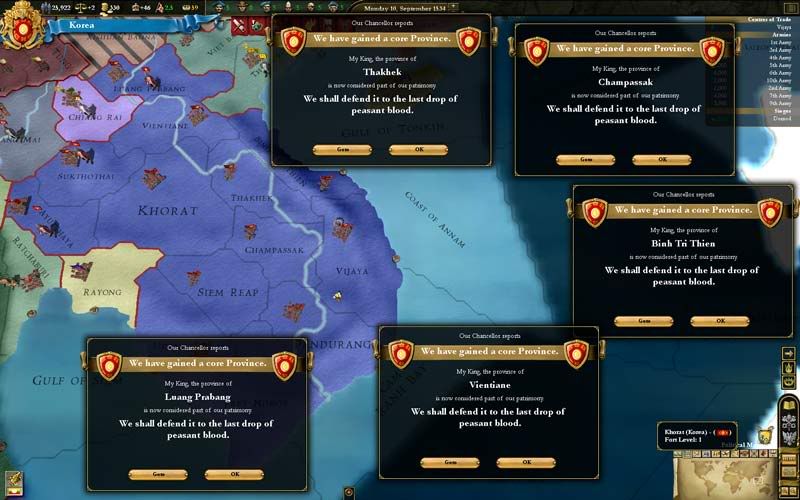
After some years of sieges and intermittent fighting, Korean forces completed the occupation of Manchu, gaining a glorious and unexpected victory for the Korean kingdom!
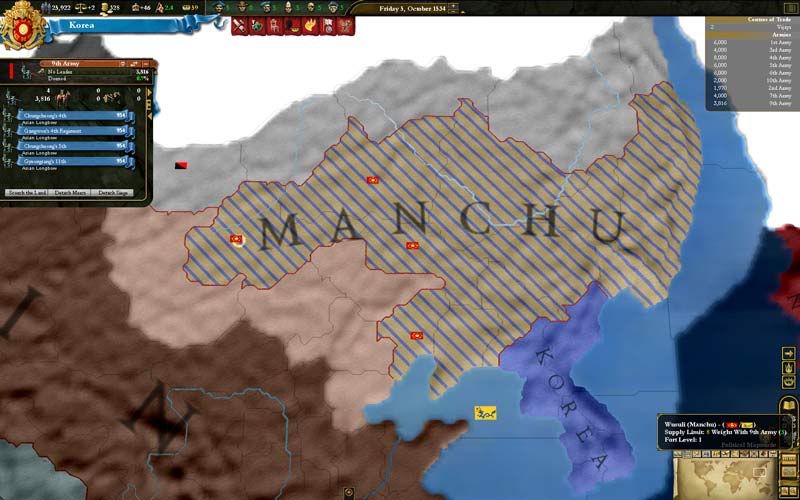
King Ye imposed a harsh peace on the defeated Manchu, claiming many of their border provinces as compensation for their arrogant attack.
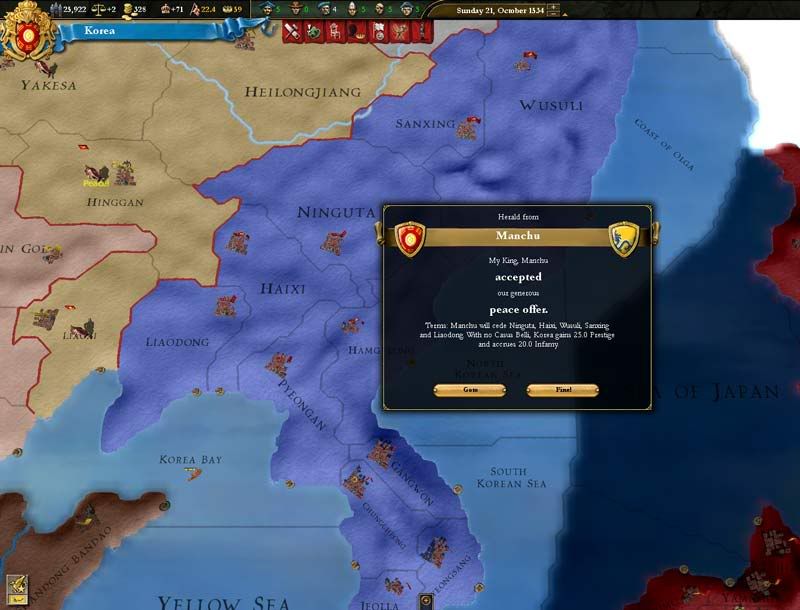
Korea had finally shown the Chinese kingdoms that it was anything but "Little China".
Gameplay comments:
Wow, didn't plan on that happening this play session! I honestly figured I would be spending some time staring at the screen waiting for cores and working on the economy. When I got that CB on Ayutthaya that gave me a free core, I couldn't NOT go for it. When Manchu invaded Korea, I was pretty worried but the army I threw together did for them. I am over my forcelimits now though.
I honestly figured I would be spending some time staring at the screen waiting for cores and working on the economy. When I got that CB on Ayutthaya that gave me a free core, I couldn't NOT go for it. When Manchu invaded Korea, I was pretty worried but the army I threw together did for them. I am over my forcelimits now though.
Anyone have any tips on how I can get my Korean culture to spread?
With a large portion of Southeast Asia under his control, King Ye knew that it was time to consolidate his gains and increase the wealth and capabilities of his nation. While he did not feel that he had accomplished all he might have wished in terms of conquest, he knew that he could leave his successors with a base to start with that would allow them to dominate Asia.
Never one to act timidly, Ye decided that a bold economic move was necessary - the creation of a new Centre of Trade. It was decided that Vijaya would host the new merchant centre, as the benefits of the trade would be more useful in a productive province. Vijaya's location on the coast might also draw the more adventurous merchants - those who would colonize new lands in the name of the Korean throne in return for monopolies on the new areas.

The establishment of the Centre of Trade had indeed attracted several adventuresome merchants - Ye granted them a charter and offered the use of his cogs to establish the first colony of the Korean throne on the island of Taiwan. A detachment of soldiers was also sent along to ensure that the natives recognized their place in the hierarchy.

Once the new Centre of Trade had been established and the taxes had begun to flow, King Ye felt that his kingdom was at a point of equilibrium. His advisors and bureaucrats could deal with the day-to-day happenings while the king would bide his time, waiting for the full integration of the former Lan Xang provinces into the Korean realm. With that thought in mind, Ye ventured to his countryside palace to enjoy a period of relaxation.
The thunder of hooves on the bricks of the courtyard shattered his relaxation almost immediately however. Ye's advisors had sent word that a diplomatic slip by the King of Ayutthaya had the possibility of being exploited into a cause for war and a claim to the lands of Ayutthaya province itself! (Conquest CB on Ayutthaya giving me a free core! Woohoo!) A messenger was quickly dispatched to inform the king of Ayutthaya that his false reign over the province would soon be at an end.
Korean forces stormed into Ayutthaya and confronted the 6,000 man strong Ayutthaya force there, engaging them in a bloody but victorious battle.


The speed of the victory and the complete success of the diplomatic maneuver pleased Ye - he had acquired a valuable province which was willing to join the Korean kingdom immediately and had gained even more concessions from Ayutthaya.

However, the sweetness of the victory would soon sour. Manchu, in its arrogance, used the Korean king's just intervention as a cause for war, declaring that their intention was to protect the independence of Ayutthaya! A large Manchu army crossed the border into the lightly-defended homelands of Korea. The small Korean garrison force, outnumbered by nearly 10,000 men, was ordered to do everything in its power to slow down the Manchu advance. Its general, knowing that his life and his men's lives were forfeit, engaged the Manchu then drew them into a long series of marches and counter-marches in the northern foothills of Korea. This brave but ultimately fatal course of action allowed for the emergency recruitment of a new army in the southern provinces. Pyeongan soon fell to the Manchu, but the combination of the siege and the efforts of the garrison troops had done what was necessary to allow the new army to get into position.


The newly-established Punitive Army of Korea drove the remnants of the Manchu invaders back into their lands and finally destroyed them in Haixi while a detachment lifted the occupation of Pyeongan.

This left the lands of the Manchu virtually undefended, and general Gyeong An quickly moved to separate his forces into siege groups that spread across the Manchu provinces.

Meanwhile, the exploits of the Korean army had impressed the Southeast Asian subjects of the king that they willingly submitted totally to his authority.

After some years of sieges and intermittent fighting, Korean forces completed the occupation of Manchu, gaining a glorious and unexpected victory for the Korean kingdom!

King Ye imposed a harsh peace on the defeated Manchu, claiming many of their border provinces as compensation for their arrogant attack.

Korea had finally shown the Chinese kingdoms that it was anything but "Little China".
Gameplay comments:
Wow, didn't plan on that happening this play session!
Anyone have any tips on how I can get my Korean culture to spread?
Church Attendance Duty, Divine Supremacy ideas, same religion, and serfdom are the main things which increase the likelyhood. Stability, Peace, and low revolt risk also help. Probably more fun to focus on the downfall of the Ming or the Japansese? How's the infamy doing?
having the focus on the culturan border increase the likeliness of the event , , it will fire once you have converted and cored the provinces , at a slightly faster pace from manchu provinces as they are in the same culture group
you can also have it on your CoT , then have it spray from here , but with the low odds it will be slow if that were to happen
you can also have it on your CoT , then have it spray from here , but with the low odds it will be slow if that were to happen
@Wolfhashat: thanks - national ideas are pretty scarce, so i'll just grind it out  badboy was getting a little high - in the mid 20's
badboy was getting a little high - in the mid 20's
@sprites: okay, I'll hang on and wait on the Manchu lands. Looks like culture spread/conversion is largely luck then?
@sprites: okay, I'll hang on and wait on the Manchu lands. Looks like culture spread/conversion is largely luck then?
Chapter Eight - Building a nation
The events of the past decade had left Korea greatly enriched, both in wealth and in new lands. As a prudent ruler, King Ye realized that he was responsible for ensuring that those new riches were secured and incorporated more fully into the Korean holdings. His greatest desire was to ensure that the lands taken from the Manchu were secured to provide a buffer between the Chinese kingdoms and the Korean homelands. Of course, the wealth of some of the new provinces was nothing to sneeze at either!
Ye's first decision was to construct fortifications in the neglected province of Ninguta - this would give the local populace the message that their new king would provide for them to a higher degree than the Manchu pretender, and would give the province a better base for resisting any invasion.

The new lands were also seething with religious turmoil - the Manchu had not converted to Hinduism as the Koreans had, and so the new provinces were largely Confucian. This left Ye's missionaries with a great work to accomplish.

In the meantime, the decision to establish a Korean colony on Taiwan was beginning to show its value - reports came that a burgeoning chinaware industry was forming on the island!
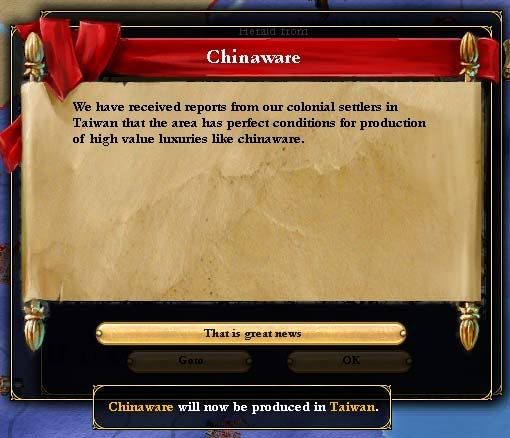
Although the next few years were peaceful, the Korean army was kept on high alert and very busy smashing rebel forces in the conquered areas of Manchu and Ayutthaya. Ye was secretly pleased as this provided his generals with something to focus on besides politics and gave his men a fine fighting spirit.
To speed up the integration and conversion of the new Korean lands, Ye ordered that the focus of the nation's efforts be moved once again - this time to Haixi!
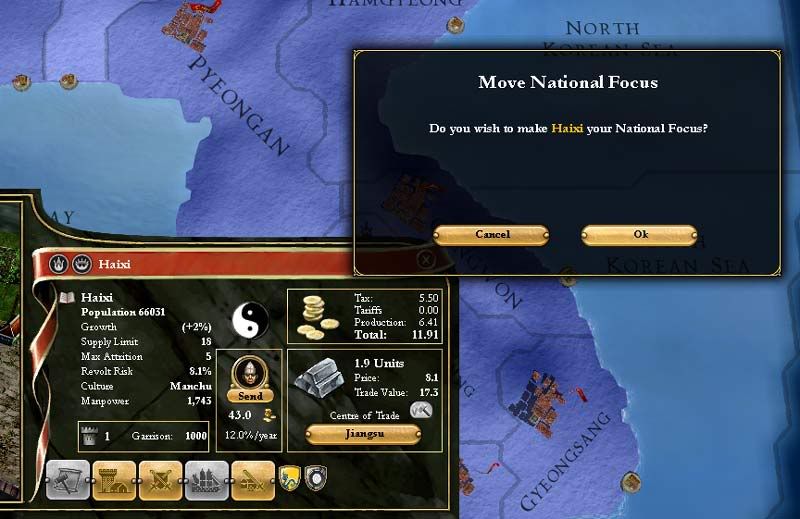
A few years thereafter, the fruits of this decision became apparent:
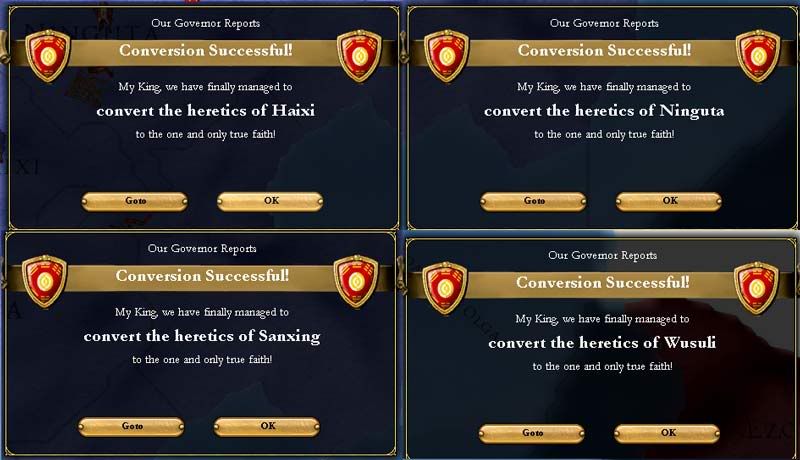
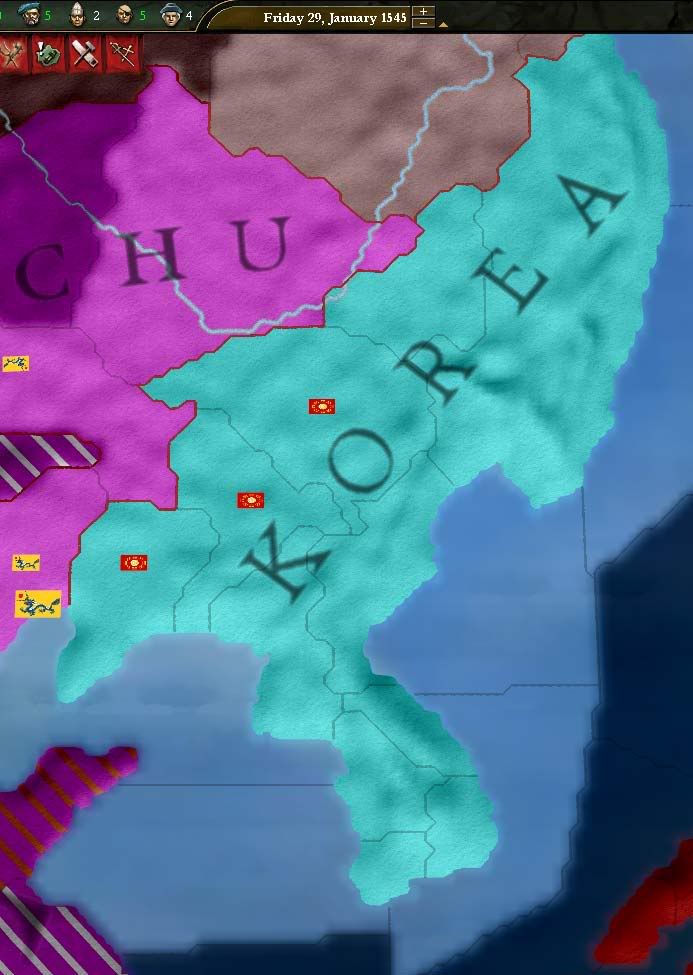
In early 1545, word reached the Korean court that a nationalist uprising in the states of Chiang Rai and Rayong had overthrown the local Ming governors and reestablished the state of Sukthothai. This presented two compelling causes for war to the king: one, it allowed him to solidify his borders in Indochina, and two, he knew that the Sukthothai patriots would harbour a grudge against him for seizing their original homelands. Thus, the decision was made to go to war!
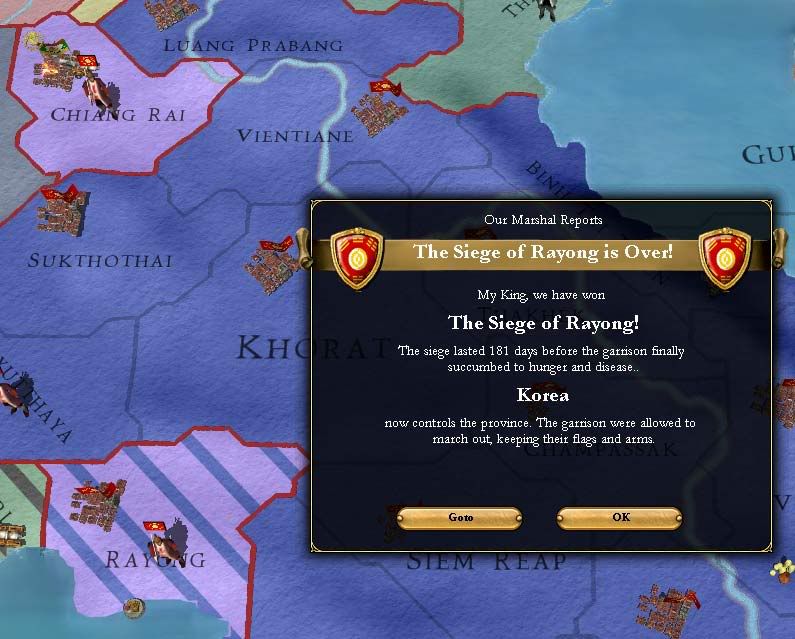
Apparently, the Sukthothai had found time to send envoys to various neighbouring states, as Shan and Pegu declared war in support. Having completed the occupation of the Sukthothai provinces, the Korean army swiftly attacked the smaller Pegu state.
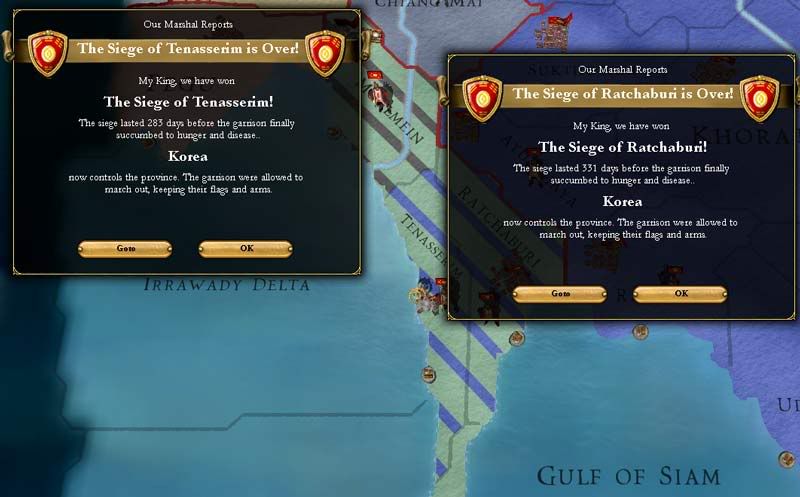
Again, Ye preserved his reputation by enforcing a peace on Pegu that did not involve land grabs.
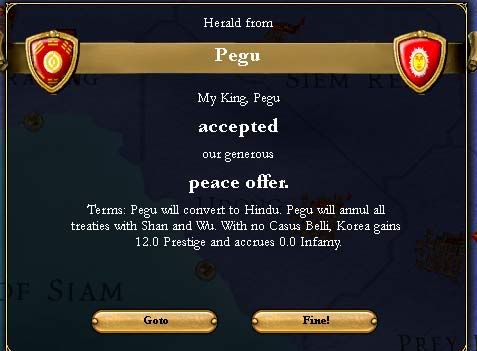
Shortly thereafter, Ye annexed the provinces of Chiang Rai and Rayong and concluded a peace with Shan. His courtiers informed him that international opinion was beginning to slant against Korea - the recent large land annexations had caused many to see Korea as a greedy invader!

To combat this perception, Ye ordered a flourishing of the arts in Korea, hoping that an internal focus would allow his wounded reputation time to recover.
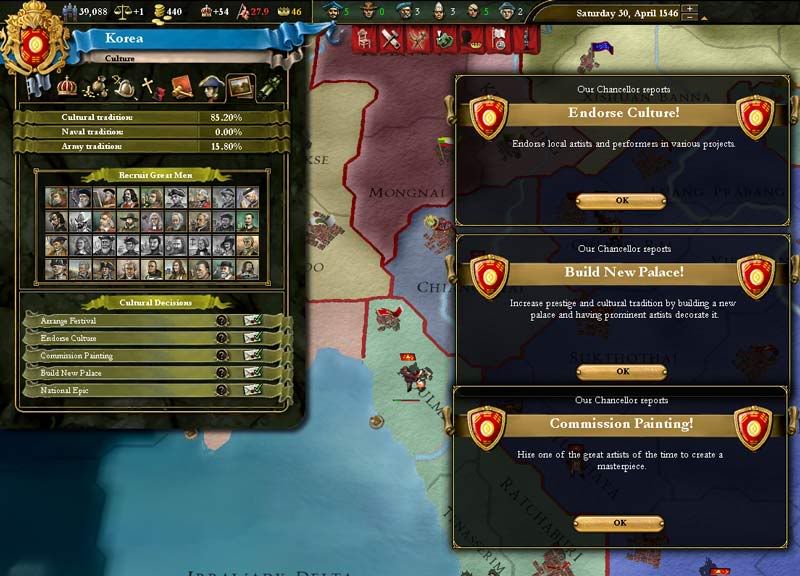
One of the pleasant side effects of the cultural flowering of Korea was the arrival of a prominent diplomat. He was quickly brought on to advise in the rehabilitation of the Korean reputation.
Ye, as usual, began to pacify his new acquisitions. He ordered a missionary to be dispatched to Rayong - this would be the last act of his illustrious reign. In 1546, Ye died, passing the title to Jeong II Ming.
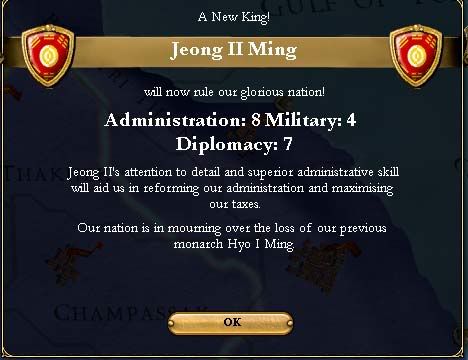
Jeong was a product of great education and had experience in the workings of the bureaucracy. His high level of skill in administration and diplomacy meant a new golden age for the kingdom of Korea. Peace allowed the economy to flourish, while the aristocracy and many local governors were exceedingly grateful for the gracious rule of Jeong.
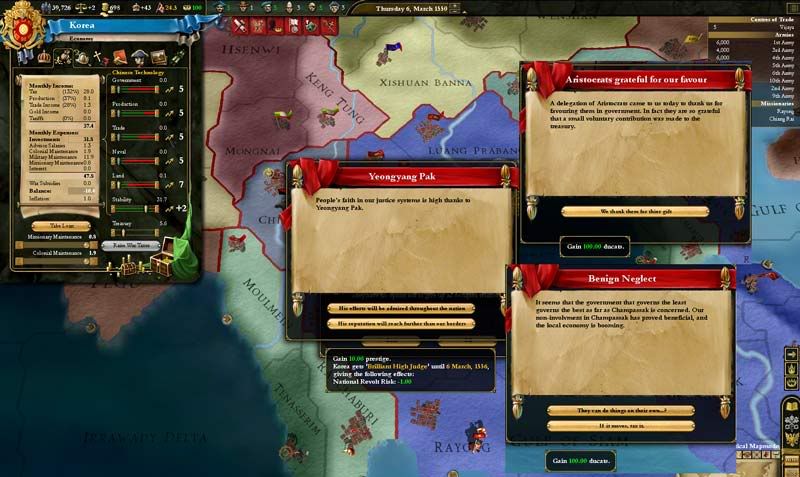
By 1553, the colony in Taiwan had attracted so many new settlers that it had been added to the ranks of self-sufficient provinces of Korea! This provided a new source of income through taxation and allowed the king to halt the previous subsidies to the colony.
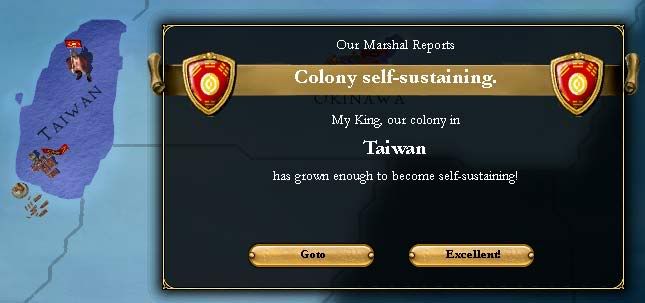
Many years of relative quiet settled over the lands of Korea as its king extended his efficient and just rule through the provinces. Taxes and trade filled the coffers of Korea and all provinces acknowledged the state religion as being supreme.
This long period of peace gradually eased the worries of the states surrounding Korea, especially since Jeong had shown no tendencies towards militarism of any kind. However, the Joseon blood that flowed through Jeong's veins carried the martial spirit of his forefathers. Beneath Jeong's quiet exterior lay the heart of a conquerer...
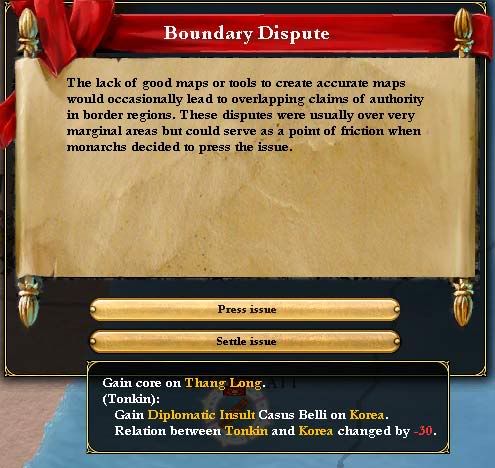
Gameplay comments:
As usual, I was planning on a period of peace to knock down my badboy and give some breathing space, but ended up in a war over a couple of minor provinces Still, it prettied up my borders and my new king is a nice one - good for the economy and rebuilding for sure. My badboy got pretty high - up to 27-28, which was a little more than I was comfortable with as I like to pick when I go to war. Who knows what might happen with the Thang Long CB...
Still, it prettied up my borders and my new king is a nice one - good for the economy and rebuilding for sure. My badboy got pretty high - up to 27-28, which was a little more than I was comfortable with as I like to pick when I go to war. Who knows what might happen with the Thang Long CB... 
The events of the past decade had left Korea greatly enriched, both in wealth and in new lands. As a prudent ruler, King Ye realized that he was responsible for ensuring that those new riches were secured and incorporated more fully into the Korean holdings. His greatest desire was to ensure that the lands taken from the Manchu were secured to provide a buffer between the Chinese kingdoms and the Korean homelands. Of course, the wealth of some of the new provinces was nothing to sneeze at either!
Ye's first decision was to construct fortifications in the neglected province of Ninguta - this would give the local populace the message that their new king would provide for them to a higher degree than the Manchu pretender, and would give the province a better base for resisting any invasion.

The new lands were also seething with religious turmoil - the Manchu had not converted to Hinduism as the Koreans had, and so the new provinces were largely Confucian. This left Ye's missionaries with a great work to accomplish.

In the meantime, the decision to establish a Korean colony on Taiwan was beginning to show its value - reports came that a burgeoning chinaware industry was forming on the island!

Although the next few years were peaceful, the Korean army was kept on high alert and very busy smashing rebel forces in the conquered areas of Manchu and Ayutthaya. Ye was secretly pleased as this provided his generals with something to focus on besides politics and gave his men a fine fighting spirit.
To speed up the integration and conversion of the new Korean lands, Ye ordered that the focus of the nation's efforts be moved once again - this time to Haixi!

A few years thereafter, the fruits of this decision became apparent:


In early 1545, word reached the Korean court that a nationalist uprising in the states of Chiang Rai and Rayong had overthrown the local Ming governors and reestablished the state of Sukthothai. This presented two compelling causes for war to the king: one, it allowed him to solidify his borders in Indochina, and two, he knew that the Sukthothai patriots would harbour a grudge against him for seizing their original homelands. Thus, the decision was made to go to war!

Apparently, the Sukthothai had found time to send envoys to various neighbouring states, as Shan and Pegu declared war in support. Having completed the occupation of the Sukthothai provinces, the Korean army swiftly attacked the smaller Pegu state.

Again, Ye preserved his reputation by enforcing a peace on Pegu that did not involve land grabs.

Shortly thereafter, Ye annexed the provinces of Chiang Rai and Rayong and concluded a peace with Shan. His courtiers informed him that international opinion was beginning to slant against Korea - the recent large land annexations had caused many to see Korea as a greedy invader!

To combat this perception, Ye ordered a flourishing of the arts in Korea, hoping that an internal focus would allow his wounded reputation time to recover.

One of the pleasant side effects of the cultural flowering of Korea was the arrival of a prominent diplomat. He was quickly brought on to advise in the rehabilitation of the Korean reputation.
Ye, as usual, began to pacify his new acquisitions. He ordered a missionary to be dispatched to Rayong - this would be the last act of his illustrious reign. In 1546, Ye died, passing the title to Jeong II Ming.

Jeong was a product of great education and had experience in the workings of the bureaucracy. His high level of skill in administration and diplomacy meant a new golden age for the kingdom of Korea. Peace allowed the economy to flourish, while the aristocracy and many local governors were exceedingly grateful for the gracious rule of Jeong.

By 1553, the colony in Taiwan had attracted so many new settlers that it had been added to the ranks of self-sufficient provinces of Korea! This provided a new source of income through taxation and allowed the king to halt the previous subsidies to the colony.

Many years of relative quiet settled over the lands of Korea as its king extended his efficient and just rule through the provinces. Taxes and trade filled the coffers of Korea and all provinces acknowledged the state religion as being supreme.
This long period of peace gradually eased the worries of the states surrounding Korea, especially since Jeong had shown no tendencies towards militarism of any kind. However, the Joseon blood that flowed through Jeong's veins carried the martial spirit of his forefathers. Beneath Jeong's quiet exterior lay the heart of a conquerer...

Gameplay comments:
As usual, I was planning on a period of peace to knock down my badboy and give some breathing space, but ended up in a war over a couple of minor provinces
Last edited:
Chapter Nine - Expansion
Jeong, though noted as a peaceful administrator, longed to see his name recorded in history beside the names of his illustrious forefathers. When his advisors brought him the news that the population in Thang Long desired to join the Korean realm, he quickly began to plot a new war of Korean conquest.
The kingdom of Tonkin was a long time ally of Shan, and Jeong knew that the puppet king of Manchu has also guaranteed their independence. Regardless of this fact, Jeong believed that the risk was worth it for the possible reward - Thang Long was a rich province, and its people's willingness to join their Korean brothers meant it would quickly conttribute to the Korean economy and war machine. The decision was made to declare war! Shan and Manchu quickly announced their support for Tonkin, and Korea found itself engaged in another 3-front war.
Two Korean armies had been staged on the border with Tonkin - they swiftly crushed the small Tonkin forces and besieged the two provinces of Viet Bac and Thang Long.


By late 1574, the Tonkin lands were occupied, freeing Korean forces to deal with the threat from Shan. Korean forces marched to the Shan lands, defeating their main army and moving to attack their provinces.
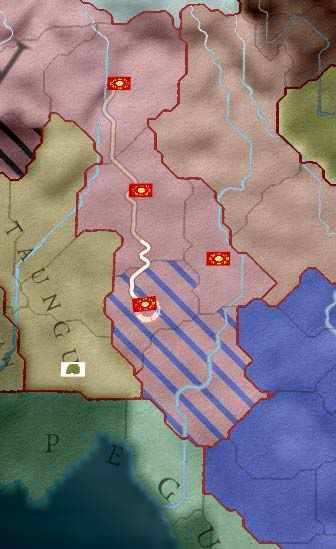
Meanwhile, the Manchu declaration of war had proven to be a mistake on their part. The Korean defenders had relied on the old maxim that the best defence is a good offence, and had invaded the Manchu capital of Hinggan. Other smaller forces soon spread through the Manchu lands, as their shattered armies could no longer provide effective resistance.
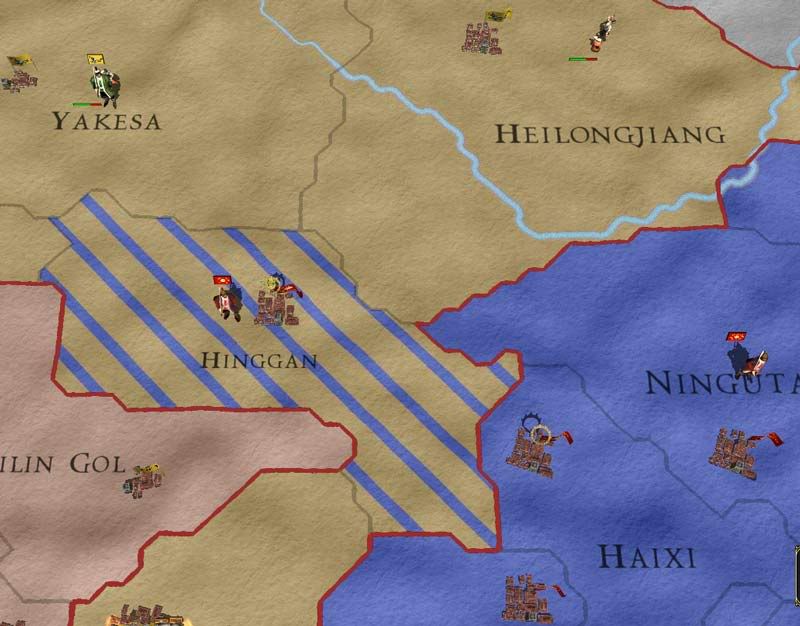
In less than a year, the Korean army had won an astonishing victory against the traditional Manchu foe.
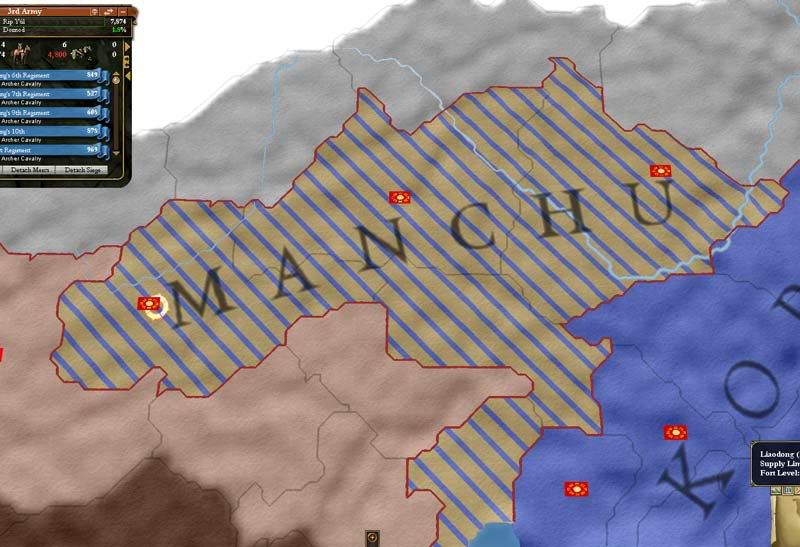
Jeong desired to finish the war against Shan before settling on peace terms with the enemy alliance - this would give him the opportunity to set peace terms for each member of the enemy alliance and gain Korea the maximum amount of concessions. As soon as the Korean army had occupied enough of the Shan lands, his diplomats moved to secure the victories:
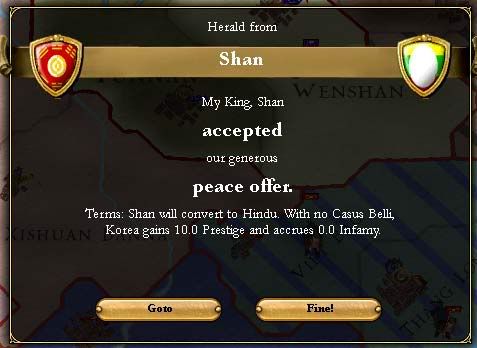
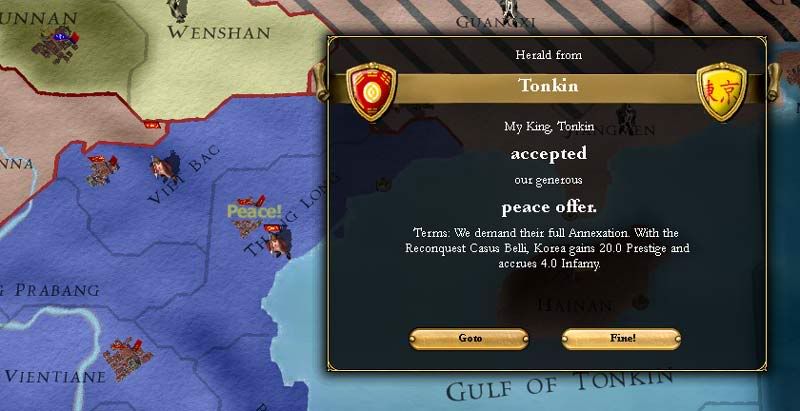
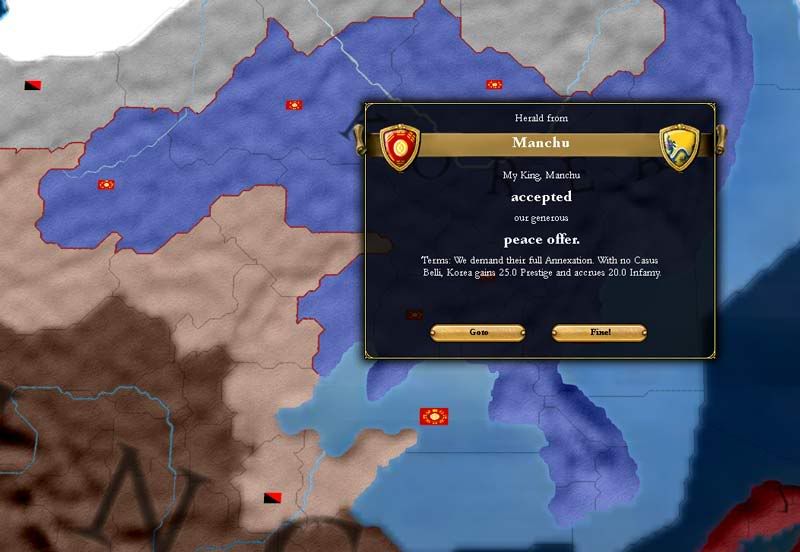
Korea's territory had just expanded massively and its reputation on the world stage was ever-growing. The Manchu threat to the Korean homelands was ended, and rich provinces had been added to the Korean fold.
The tensions inherent in joining the new lands to the Korean kingdom were present as expected - the Manchu lands were stll Confucian and had to be converted, as were the lands gained in Indochina. Jeong put his bureaucrats and missionaries back to work converting the new lands. The efforts in Thang Long bore fruit almost immediately.
As seemed to be the pattern in Korean history, a few years after his greatest accomplishment, King Jeong went to join his forefathers. His son, Yeongyang, showed a similar bent for administrative skill.
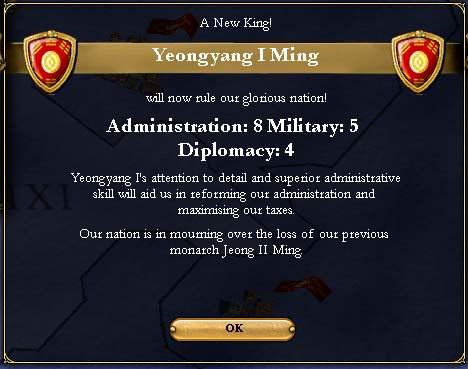
Soon, the benefits of the peace treaty signed between Korea and Shan became obvious - Shan had converted the provinces of Hsenwi and Chiang Mai to Hinduism! This gained the attention of the new king - his realm still had a claim on the province of Keng Tung that could be very useful.
The welcome news that the first group of Manchu lands to be conquered by Korea were fully integrated into the kingdom came in 1584, dramatically increasing the manpower and wealth of the nation.
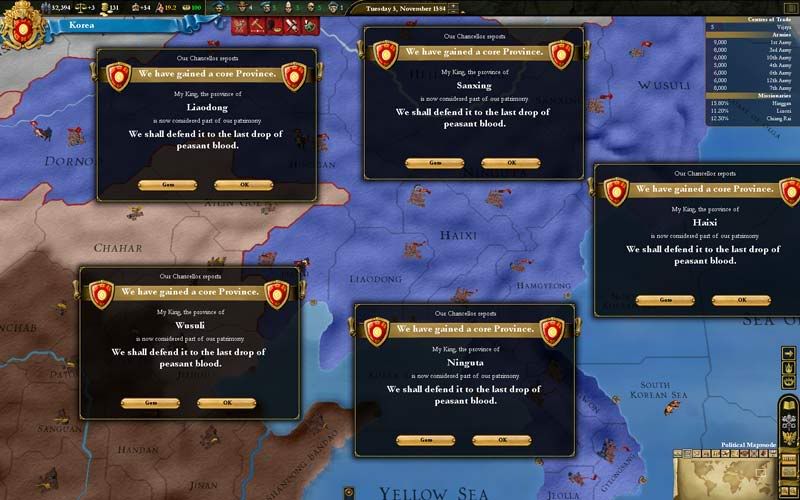
Then, in 1586, the Ming attacked the weakened Shan and Yeongyang's hand was forced - he could not allow the entire lands of the Shan to be swallowed by the hated Ming. His diplomats declared war and his armies marched on the reduced Shan kingdom.

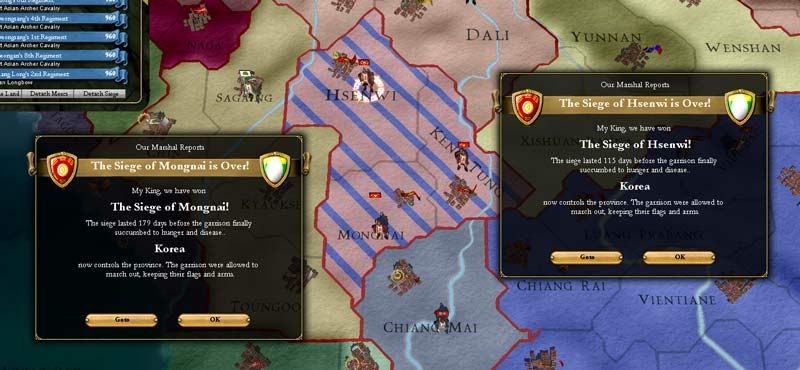
The terms of the peace were generous as the young king could not afford to present himself as any more of a conquerer without attracting negative world attention.
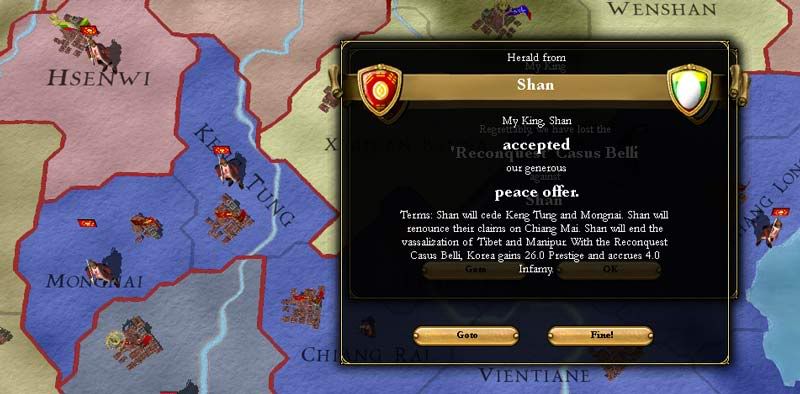
Still, the Korean kingdom was richer and larger than ever. The only remaining problem was the fact that it was effectively cut in two by its largest rival...
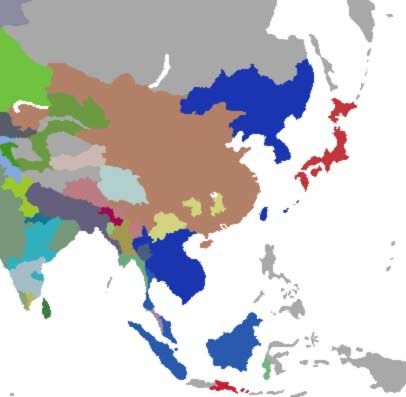
Gameplay comments:
Well, that was a good session Finally got a nice big old chunk of land and got rid of the Manchu as well! My only problem was badboy getting up high again since I never seem to have a CB that really allows me to get away with much. My next major goal is to connect my two separate halves of the kingdom into a whole, but that involves taking on the Ming monster and I don't really have the manpower for it yet - they have nearly two times as many regiments as I do!
Finally got a nice big old chunk of land and got rid of the Manchu as well! My only problem was badboy getting up high again since I never seem to have a CB that really allows me to get away with much. My next major goal is to connect my two separate halves of the kingdom into a whole, but that involves taking on the Ming monster and I don't really have the manpower for it yet - they have nearly two times as many regiments as I do!
Jeong, though noted as a peaceful administrator, longed to see his name recorded in history beside the names of his illustrious forefathers. When his advisors brought him the news that the population in Thang Long desired to join the Korean realm, he quickly began to plot a new war of Korean conquest.
The kingdom of Tonkin was a long time ally of Shan, and Jeong knew that the puppet king of Manchu has also guaranteed their independence. Regardless of this fact, Jeong believed that the risk was worth it for the possible reward - Thang Long was a rich province, and its people's willingness to join their Korean brothers meant it would quickly conttribute to the Korean economy and war machine. The decision was made to declare war! Shan and Manchu quickly announced their support for Tonkin, and Korea found itself engaged in another 3-front war.
Two Korean armies had been staged on the border with Tonkin - they swiftly crushed the small Tonkin forces and besieged the two provinces of Viet Bac and Thang Long.


By late 1574, the Tonkin lands were occupied, freeing Korean forces to deal with the threat from Shan. Korean forces marched to the Shan lands, defeating their main army and moving to attack their provinces.

Meanwhile, the Manchu declaration of war had proven to be a mistake on their part. The Korean defenders had relied on the old maxim that the best defence is a good offence, and had invaded the Manchu capital of Hinggan. Other smaller forces soon spread through the Manchu lands, as their shattered armies could no longer provide effective resistance.

In less than a year, the Korean army had won an astonishing victory against the traditional Manchu foe.

Jeong desired to finish the war against Shan before settling on peace terms with the enemy alliance - this would give him the opportunity to set peace terms for each member of the enemy alliance and gain Korea the maximum amount of concessions. As soon as the Korean army had occupied enough of the Shan lands, his diplomats moved to secure the victories:



Korea's territory had just expanded massively and its reputation on the world stage was ever-growing. The Manchu threat to the Korean homelands was ended, and rich provinces had been added to the Korean fold.
The tensions inherent in joining the new lands to the Korean kingdom were present as expected - the Manchu lands were stll Confucian and had to be converted, as were the lands gained in Indochina. Jeong put his bureaucrats and missionaries back to work converting the new lands. The efforts in Thang Long bore fruit almost immediately.
As seemed to be the pattern in Korean history, a few years after his greatest accomplishment, King Jeong went to join his forefathers. His son, Yeongyang, showed a similar bent for administrative skill.

Soon, the benefits of the peace treaty signed between Korea and Shan became obvious - Shan had converted the provinces of Hsenwi and Chiang Mai to Hinduism! This gained the attention of the new king - his realm still had a claim on the province of Keng Tung that could be very useful.
The welcome news that the first group of Manchu lands to be conquered by Korea were fully integrated into the kingdom came in 1584, dramatically increasing the manpower and wealth of the nation.

Then, in 1586, the Ming attacked the weakened Shan and Yeongyang's hand was forced - he could not allow the entire lands of the Shan to be swallowed by the hated Ming. His diplomats declared war and his armies marched on the reduced Shan kingdom.


The terms of the peace were generous as the young king could not afford to present himself as any more of a conquerer without attracting negative world attention.

Still, the Korean kingdom was richer and larger than ever. The only remaining problem was the fact that it was effectively cut in two by its largest rival...

Gameplay comments:
Well, that was a good session
Very well done! Once those new provinces core, you'll have quite an army. Maybe not enough to take on Ming, but close.
Also, what on Earth happened to Vijayanagar? Last time you showed a map, they were all the way in Bengal!
Also, what on Earth happened to Vijayanagar? Last time you showed a map, they were all the way in Bengal!
@dinofs - thanks for the congrats  as for Vijayanagar, I wasn't keeping very close tabs but they collapsed and now they are almost irrelevant! Looks like plenty of action in India.
as for Vijayanagar, I wasn't keeping very close tabs but they collapsed and now they are almost irrelevant! Looks like plenty of action in India.
Chapter Ten - I got 99 problems and they're all Ming regiments
*NOW NEW AND IMPROVED*
AUTHOR'S NOTE: I've decided to switch to a pure gameplay style for my AAR - I think the weird grey area between narrative and gameplay has been putting off some readers. Not enough characterization and story for the narrative readers, and too much narrative to wade through for gameplay readers. So, onwards and upwards with a straight gameplay style. Of course, any comments on style are welcome.
The year is 1587 - Korea is split into two effective kingdoms by the Ming lands. Unfortunately, I'm not quite strong enough to take them on yet. My ultimate goal is to create a land connection between my two territories, hopefully by creating a corridor all along the coast of China. This would give me the richest provinces of China, seal the Ming off from the sea, and give me the land connection I want. To that end, I'm waiting for my captured Manchu lands to core to extend my forcelimits and give me more manpower to take on the mighty Ming I figure in the meantime I have some converting to do.
I figure in the meantime I have some converting to do.

After about ten years of waiting (I'm trying to get to 1625 for those cores), the Ming decide to preempt my plans! They declare war without a CB (forgot the screenie, sorry!). Their vassal Lan Na also joins, not that that really matters.

In the face of massive Ming stacks that I can't compete with, I decide some drastic action is necessary. In the middle of the war with Ming, I change out my National Bank NI for Military Drill, hoping the morale boost can help my armies perform better.
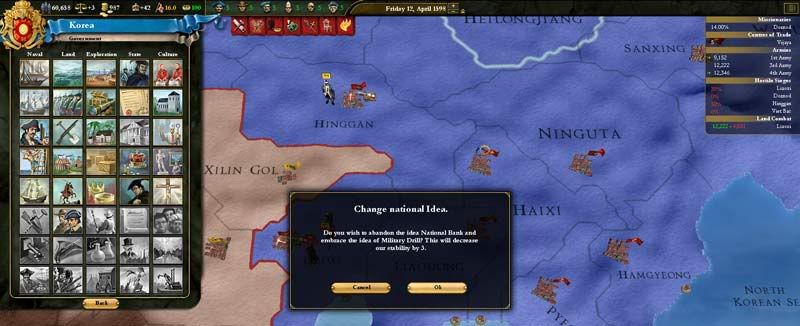
As you can see, a large Ming stack has entered my lands and is besieging Hinggan. I don't have much in the area to fight it at the time, so I have no choice but to watch as it takes Hinggan, Dornod, then comes to Liaoxi. I've placed my army there to fight them off.
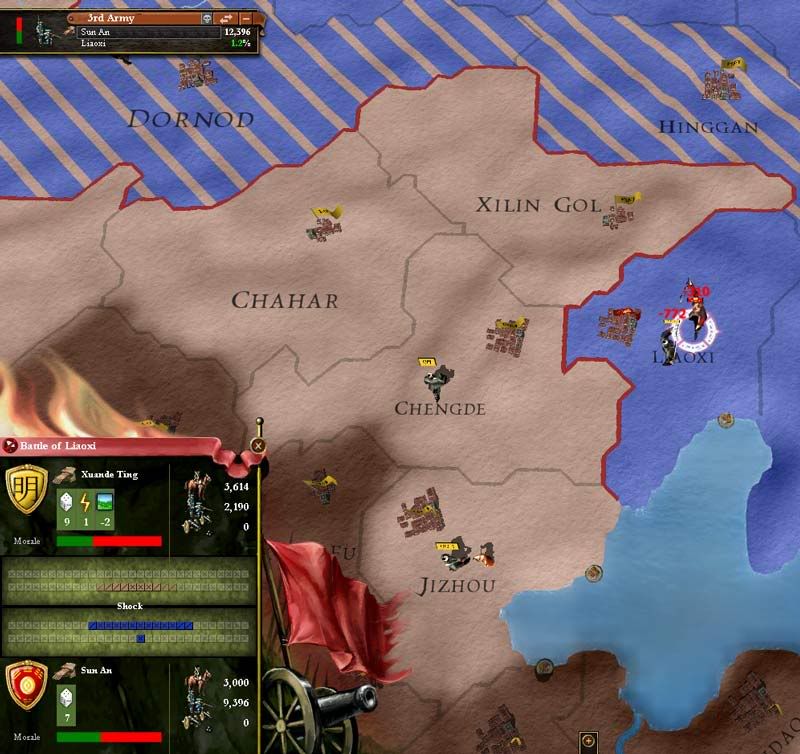
In the middle of this, Rajputana offers me an alliance! Weird timing if you ask me, but I need friends right now. I accept quickly.
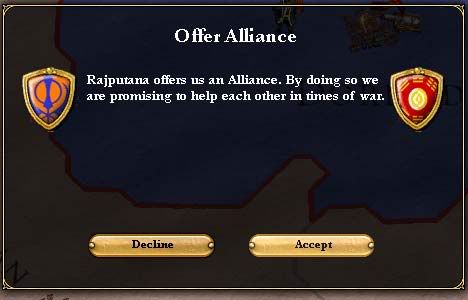
I fight off the stack in Liaoxi, but a massive doomstack is headed towards me! (about 11k cav and 22k inf.) Time to hit the panic switch says I:
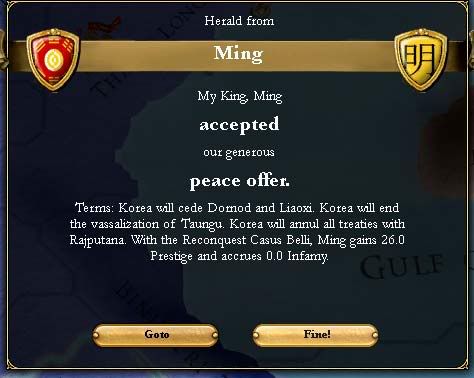
I reluctantly give up a couple of those Manchu provinces that I was waiting to core on. Grrr, not too happy with the Ming for messing everything up on me like that! Here's the new border and a peek at my nice heir:
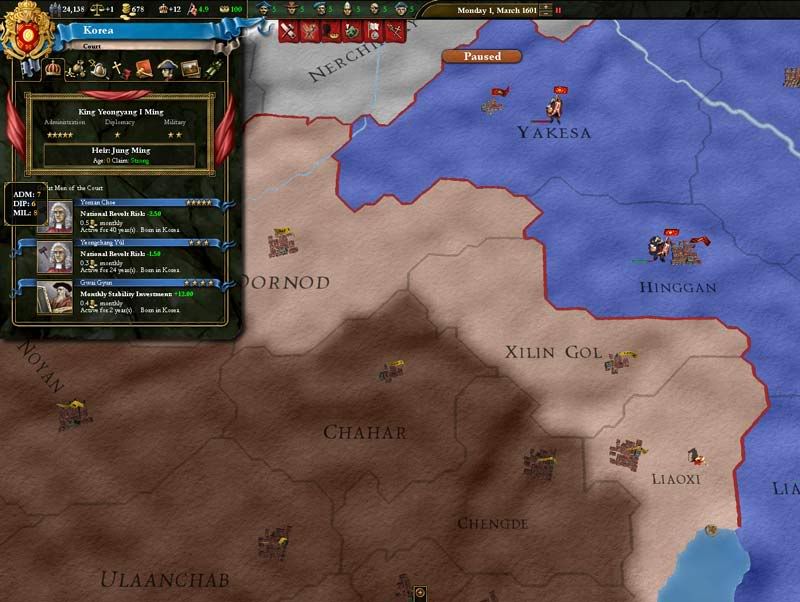
Peace returns for a bit and I have Wusuli convert to Korean culture.Shortly thereafter, my king decides to die too soon and we have the twin blessings of a pretender revolt and a regency council to deal with. The pretender army is fairly strong (6/6) and takes a little while to beat down.
Now guess who decides that they want to play with our regency council? If you guessed someone other than Ming, no gold star for you!
I jump on to the offensive in the hopes that I can grab some provinces quickly and force a peace before the massive Ming armies roll over me. An army is sent into Guangxi and routs the Ming defenders. However, soon thereafter this rolls in:
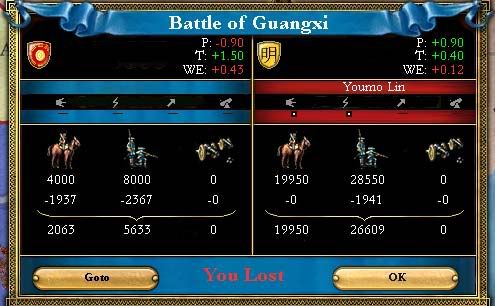
Oooookay, well that army is about 3/4 of the size of all my armies put together!I scorch Thang Long and retreat. To now, I haven't even looked up north to see the situation there as I was too busy with this. I scroll up and....hey, I thought I got rid of you guys!
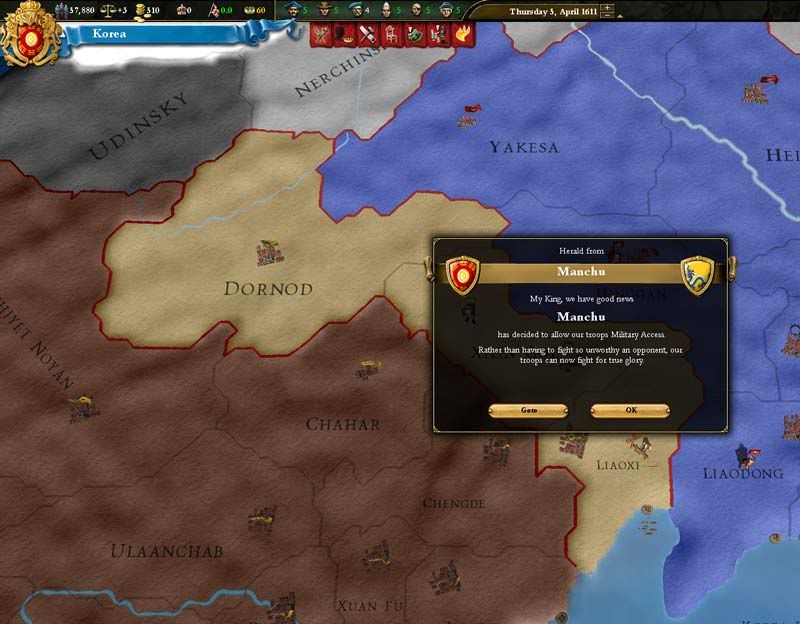
The Manchu are back and have formed a buffer between Ming and my lands! They give me military access (because we have such a great history together ) and I send some armies across into the northern Ming provinces.
) and I send some armies across into the northern Ming provinces.
Not too much happens, although the Ming do occupy Viet Bac. My northern armies have a fairly free run thanks to the Ming concentrating on the southern front and I manage to take a couple of provinces. At this point, Ming gets sulky and wants to take its ball and go home I'm happy to let them as a long war is not what I need or want right now.
I'm happy to let them as a long war is not what I need or want right now.
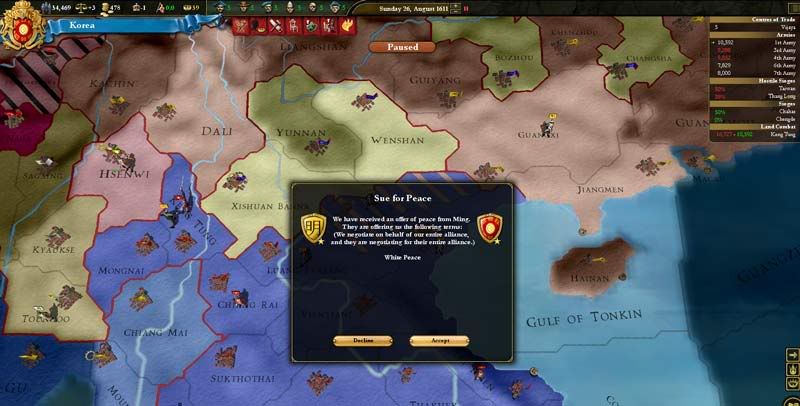
Finally my heir takes the throne (worth the wait, I guess)
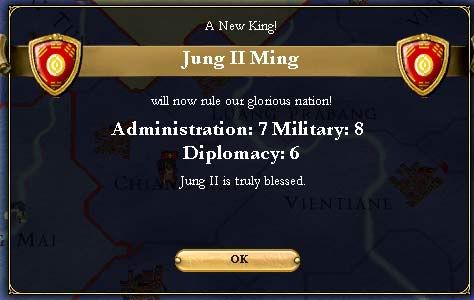
The rebuilding project continues and peace stays in place until we hit our goal:
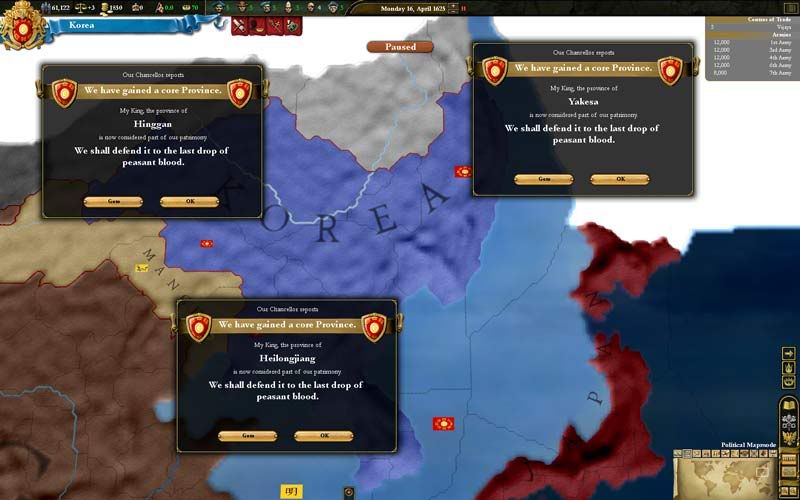
Soon it will be time to show those meanies in Ming who's the boss
*NOW NEW AND IMPROVED*
AUTHOR'S NOTE: I've decided to switch to a pure gameplay style for my AAR - I think the weird grey area between narrative and gameplay has been putting off some readers. Not enough characterization and story for the narrative readers, and too much narrative to wade through for gameplay readers. So, onwards and upwards with a straight gameplay style. Of course, any comments on style are welcome.
The year is 1587 - Korea is split into two effective kingdoms by the Ming lands. Unfortunately, I'm not quite strong enough to take them on yet. My ultimate goal is to create a land connection between my two territories, hopefully by creating a corridor all along the coast of China. This would give me the richest provinces of China, seal the Ming off from the sea, and give me the land connection I want. To that end, I'm waiting for my captured Manchu lands to core to extend my forcelimits and give me more manpower to take on the mighty Ming

After about ten years of waiting (I'm trying to get to 1625 for those cores), the Ming decide to preempt my plans! They declare war without a CB (forgot the screenie, sorry!). Their vassal Lan Na also joins, not that that really matters.

In the face of massive Ming stacks that I can't compete with, I decide some drastic action is necessary. In the middle of the war with Ming, I change out my National Bank NI for Military Drill, hoping the morale boost can help my armies perform better.

As you can see, a large Ming stack has entered my lands and is besieging Hinggan. I don't have much in the area to fight it at the time, so I have no choice but to watch as it takes Hinggan, Dornod, then comes to Liaoxi. I've placed my army there to fight them off.

In the middle of this, Rajputana offers me an alliance! Weird timing if you ask me, but I need friends right now. I accept quickly.

I fight off the stack in Liaoxi, but a massive doomstack is headed towards me! (about 11k cav and 22k inf.) Time to hit the panic switch says I:

I reluctantly give up a couple of those Manchu provinces that I was waiting to core on. Grrr, not too happy with the Ming for messing everything up on me like that! Here's the new border and a peek at my nice heir:

Peace returns for a bit and I have Wusuli convert to Korean culture.Shortly thereafter, my king decides to die too soon and we have the twin blessings of a pretender revolt and a regency council to deal with. The pretender army is fairly strong (6/6) and takes a little while to beat down.
Now guess who decides that they want to play with our regency council? If you guessed someone other than Ming, no gold star for you!
I jump on to the offensive in the hopes that I can grab some provinces quickly and force a peace before the massive Ming armies roll over me. An army is sent into Guangxi and routs the Ming defenders. However, soon thereafter this rolls in:

Oooookay, well that army is about 3/4 of the size of all my armies put together!I scorch Thang Long and retreat. To now, I haven't even looked up north to see the situation there as I was too busy with this. I scroll up and....hey, I thought I got rid of you guys!

The Manchu are back and have formed a buffer between Ming and my lands! They give me military access (because we have such a great history together
Not too much happens, although the Ming do occupy Viet Bac. My northern armies have a fairly free run thanks to the Ming concentrating on the southern front and I manage to take a couple of provinces. At this point, Ming gets sulky and wants to take its ball and go home

Finally my heir takes the throne (worth the wait, I guess)

The rebuilding project continues and peace stays in place until we hit our goal:

Soon it will be time to show those meanies in Ming who's the boss
Excellent, you may have lost two provinces, but you're even stronger now than you were back then. The buffer state between you and Ming is nice too. 
How big is your fleet? (I get the feeling that you may have to take over part of Japan to be able to truly match Ming.)
How big is your fleet? (I get the feeling that you may have to take over part of Japan to be able to truly match Ming.)
Yay, I love gameplay AAR's. Best of luck though those new Manchu's should watch their backs.
just caught up, interesting story with the Koreans, the soon to be new emperors of China 
Tim
Tim

